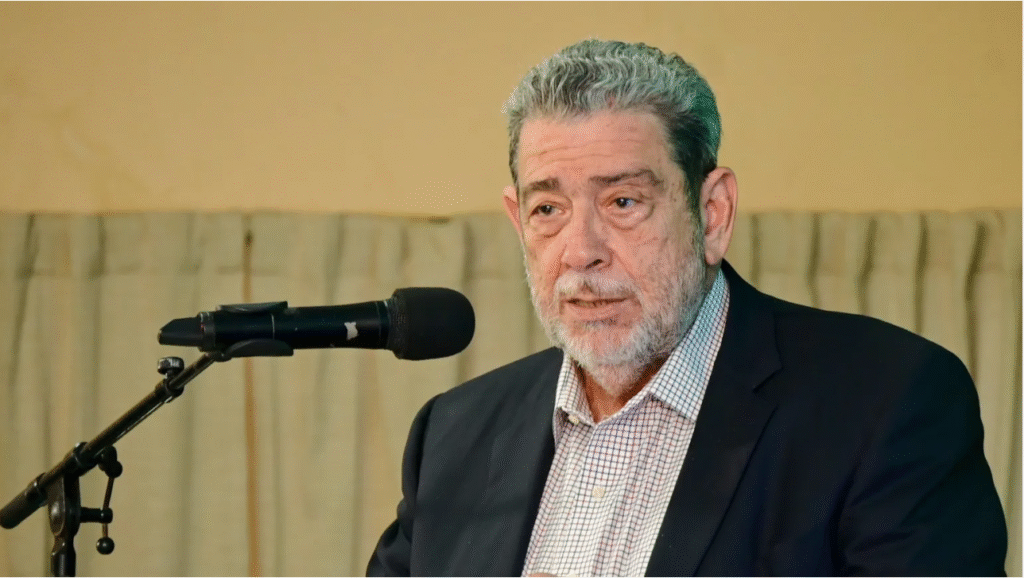KINGSTOWN — For the first time in nearly a quarter of a century, the twin-island nation of St. Vincent and the Grenadines in the eastern Caribbean is expected to be governed by someone other than Ralph Gonsalves.
In a stunning upset, opposition leader Godwin Friday is projected to be the country’s seventh prime minister after his New Democratic Party defeated Gonsalves’ Unity Labor Party in a close race, according to the St Vincent Times. Gonsalves, 79, is projected to hold onto his North Central Windward seat. He will now serve as leader of the opposition after failing to secure an unprecedented sixth-consecutive, five-year term as prime minister.
Preliminary results have the NDP winning 14 of the 15 seats that were up for grabs, the Caribbean Media Corporation reported early Friday. The historic election was a contest primarily centered between Gonsalves’ and Friday’s political parties. Among the casualties were Gonsalves’ son and finance minister, Camillo Gonsalves, once regarded as a potential leader of the ULP.

Friday, 66, who lives in Bequia, comfortably won his Northern Grenadines seat. With the election behind them, late Thursday night, he called for the nation to come together to “quickly work and build St. Vincent and the Grenadines,” which is still recovering from last year’s devastating Hurricane Beryl.
“I am going to do my very best to deliver to the people of the country,” Friday, an attorney, said in an interview with state-owned NBC radio from.
This was not Friday’s first bid at politics. In 2020, he unsuccessfully ran for Parliament. But this time around, he and his party benefitted from a desire for change from voters who were tired and heard his positions on issues regarding the island’s socio-economic development. For example, Friday supports severing ties with Taiwan in favor of mainland China, and he wants to implement the controversial citizenship by investment, CBI, program. The program allows foreigners to get a passport in exchange for making an investment. Both policies were opposed by Gonsalves, who headed one of the region’s longest, uninterrupted political dynasties.
The change of leadership in the island-nation with an estimated population of just over 100,600 residents, comes amid heightened regional tensions over the U.S. military buildup in the southern Caribbean, off the coast of Venezuela. While the Trump Administration says the operations are targeted at drug traffickers, they have divided regional leaders, some of whom believe the real purpose is to pressure Venezuelan leader Nicolás Maduro to step down.
A Maduro ally, Gonsalves has criticized the U.S. operations as well as Trinidad and Tobago’s support. He’s also expressed frustration over the lack of clarity coming from the 15-member Caribbean Community bloc known as CARICOM.
In October, during a regional conference he warned that any forced regime change in Caracas would have dire consequences, including mass migration and new security threats in the Caribbean, which has promoted itself as a zone of peace.
Since September, the U.S. strikes have killed at least 83 people.
On Wednesday, the Dominican Republic, which shares the island of Hispaniola with Haiti, agreed to allow U.S. aircraft to refuel at the San Isidro Air Base and Las Américas International Airport. The country’s decision came during a visit by U.S. Defense Secretary Pete Hegseth.
Gonsalves’ tenure in office dates to 2001. Since then, he’s emerged as not only a titan in the region, speaking out on various matters including the ongoing crisis in Haiti, a CARICOM member state. For example, he was behind a decision to put the Dominican Republic’s request to join the mostly English-speaking regional bloc on hold after the Dominican Constitutional Court in 2013 revoked the citizenships of tens of thousands of Black Dominicans and individuals of Haitian descent.
Caribbean leaders extended their congratulations to Friday.
St. Lucia opposition leader, Allen Chastanet, who is hoping to return to power in his country’s December 1 general election, told Friday the victory is a testament to his perseverance, integrity and the trust the people have placed in his leadership.
“May your tenure be guided by wisdom, progress and an unwavering commitment to the people you now serve,” he said. Jamaica Prime Minister Andrew Holness, who is the current chairman of CARICOM, said the election marks “an important moment for the Vincentian people” and his hurricane-recovering nation looks “forward to strengthening our cooperation as we continue to build a more resilient and prosperous Caribbean region together.”
Trinidad and Tobago Prime Minister Kamla Persad-Bissessar also extended congratulations. She and Gonsalves had disagreed over the U.S. operations in the Caribbean. In a statement, Persad-Bissessar, said the people of St. Vincent had given Godwin and his party, “a resounding democratic mandate.”
